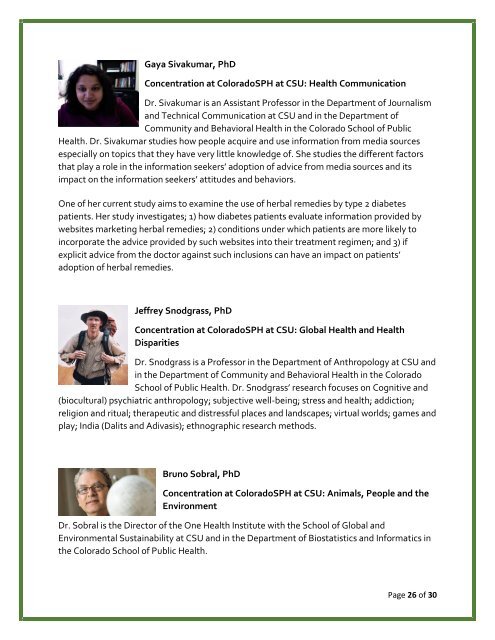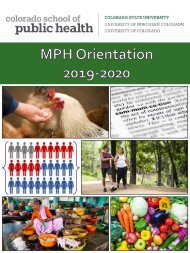Binder for website
You also want an ePaper? Increase the reach of your titles
YUMPU automatically turns print PDFs into web optimized ePapers that Google loves.
David Most, PhD<br />
Concentration at ColoradoSPH at CSU: Epidemiology<br />
Dr. Most is an Associate Professor in the Education Department and in the<br />
Department of Biostatistics in the Colorado School of Public Health. Dr.<br />
Most’s research interest is on the development of novel applications and<br />
extensions of statistical methods. His motivation in pursuing this emphasis was driven both by<br />
interests in substantive issues in education and public health, and a deep appreciation of the<br />
role of methodology in social research.<br />
Tracy Nelson, MPH, PhD<br />
Concentration at ColoradoSPH at CSU: Epidemiology (Concentration<br />
Lead), Physical Activities and Healthy Lifestyles<br />
Dr. Nelson is a Professor in the Department of Health and Exercise Science<br />
and in the Department of Epidemiology in the Colorado School of Public<br />
Health. Her research interests focus on the biobehavioral influences on<br />
soldier per<strong>for</strong>mance and health, the impact of genetic, neuroendocrine and metabolic factors<br />
on chronic disease and evaluation and interventions to improve community-level chronic<br />
disease risk.<br />
Francisco Olea-Popelka, DVM, PhD<br />
Concentration at ColoradoSPH at CSU: Animals, People and the<br />
Environment, Epidemiology<br />
Dr. Olea-Popelka is an Assistant Professor in the Clinical Sciences<br />
Department and in the Department of Epidemiology in the Colorado School<br />
of Public Health. Dr. Olea-Popelka’s research interest focuses on Applied Veterinary<br />
Epidemiology (AVE). Rather than specializing on one animal species or one specific health<br />
issue, we focus on studying factors relevant <strong>for</strong> the prevention and control of diseases at the<br />
interface of livestock, wildlife, and humans in different environments, globally. An important<br />
component of this research philosophy is an integrated multidisciplinary approach in which<br />
environmental, socio-economical, cultural, and political factors are considered in conjunction<br />
with the disease causing agent and the host when addressing health issues. Thus, we work in<br />
close partnership with government officials, large and small animal clinicians, microbiologists,<br />
molecular biologists, nurses, nutritionists, physicians, social workers, wildlife biologists,<br />
wildlife veterinarians, and policy and decision makers, among others.<br />
Page 18 of 30



